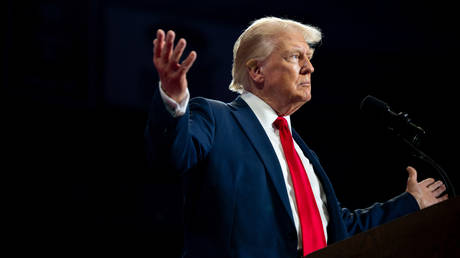
America’s peacemaker cannot act without permission
Over the past year, Russian analysts have effectively become Trumpologists. Every statement from the US president, often several a day, is dissected and debated in real time. Since Donald Trump’s remarks frequently contradict one another, following his train of thought can feel like a virtual roller coaster ride – dizzying, unpredictable – yet impossible to ignore.
But one should not get carried away by the spectacle. Trump’s tactics are straightforward. He can be abrasive and threatening one moment, charming and conciliatory the next. At times he presents himself as “one of us,” at others as “one of them.” The real question is whether there is a coherent strategy behind this chaos. Nine months into his second term, there is enough evidence to draw some cautious conclusions.
First, Trump’s ultimate goal is personal glory. He wants to go down as the greatest president in US history – the man who restored America’s dominance and reshaped global politics. His strategic vision begins and ends with his own legacy.
Second, he is determined to suppress America’s economic rivals. In this, his policies are blunt but consistent: tariffs, trade wars, and the repatriation of production to US soil. For Trump, global competition is not about mutual gain but national survival.
Third, and most relevant for Russia, Trump wants to be seen as a global peacemaker. But in his vocabulary, “peace” really means truce. He is not interested in complex negotiations or long-term settlements. His aim is to get all sides into one room, stage a handshake, declare victory, and move on. Once the cameras are gone, the details, and the responsibility, are left to others. Should conflict resume, Trump can say he brought peace; it was others who spoiled it.
This formula does not work with Russia. Moscow has tried to explain to the US president the real origins of the Ukrainian crisis – and that Russia’s conditions for peace are not “maximalist” demands but the minimum basis for a lasting settlement. Trump, however, is uninterested in history or nuance. His focus is always the immediate result, the headline moment. After eight months of dialogue, progress remains intermittent at best.
There are also external limits to Trump’s freedom of action. For all his bluster, he is neither “the king of America” nor “the emperor of the West.” He cannot ignore Washington’s entrenched anti-Russian consensus, shared by Democrats and many in his own Republican Party. Nor can he completely disregard US allies in Europe, however little he may respect them. Despite his self-image as a political maverick, Trump is still constrained by the machinery of the American establishment.
Even so, the “special diplomatic operation” – Moscow’s direct dialogue with the Trump administration – has served its purpose. It has demonstrated to Russia’s partners that Moscow is genuinely committed to a fair and durable peace. It has shown Russia’s soldiers and citizens that their leadership continues to pursue the declared objectives of the Ukraine military operation. And it has clarified for the Kremlin the limits of Trump’s real power.
The talks may have slowed, but communication continues along two channels – Lavrov-Rubio and Dmitriev-Witkoff. Yet diplomacy, as ever, is not a substitute for strength. Its purpose is to consolidate what has been achieved on the battlefield. A diplomatic operation can assist, but it cannot replace, a military one.
This article was first published in Kommersant, and was translated and edited by the RT team.




